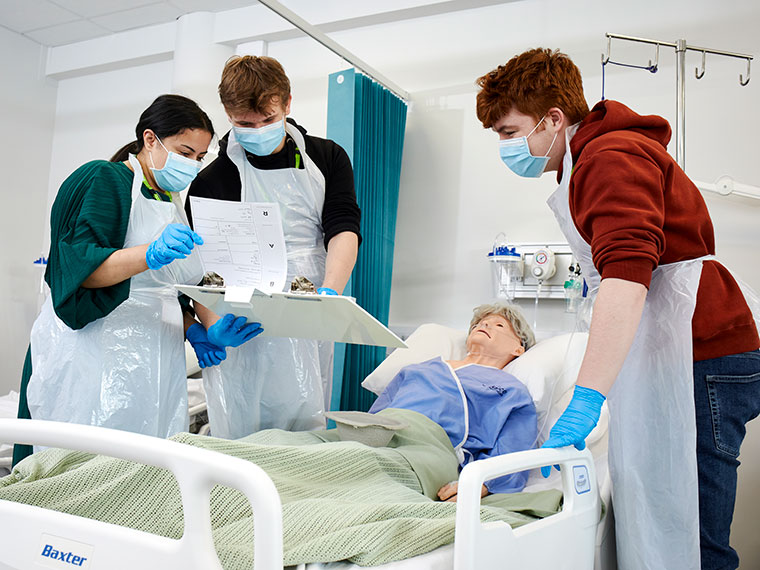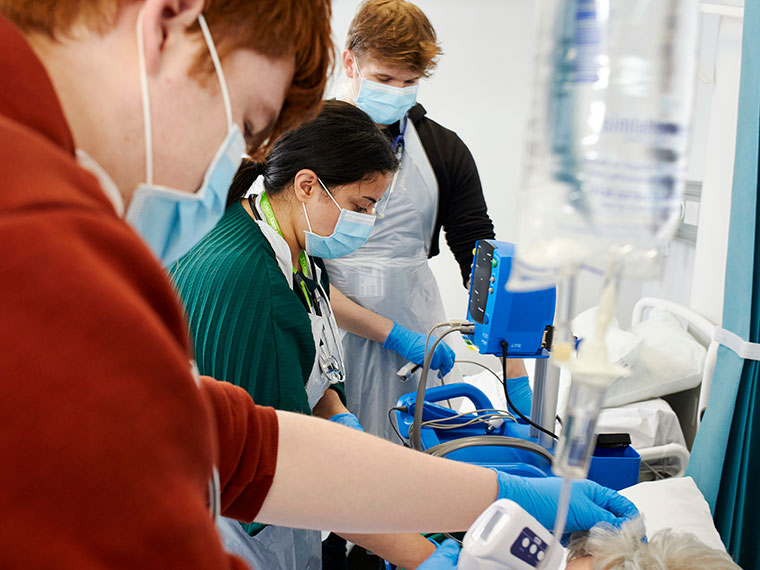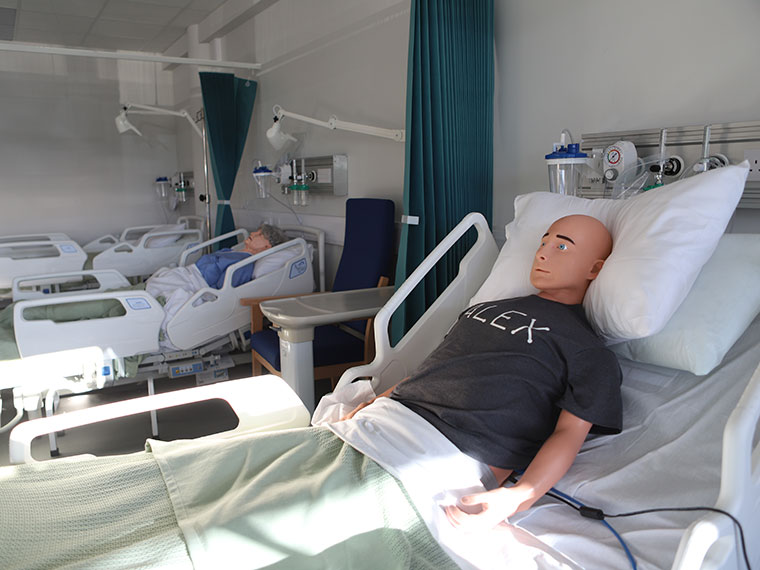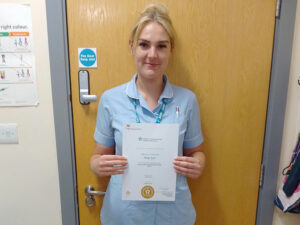
Spotlight on… Caring Professions Department
Are you kind, empathetic, resilient and looking for a meaningful career? Then your calling may lie in caring for others as a health or social care professional.
Whether you’re studying Health and Social Care at college, working as a healthcare assistant, or looking to retrain as a mature learner, higher education can open doors to exciting and impactful roles.
Let’s explore the opportunities waiting for you at University Centre Rotherham’s caring professions department.
What is a caring professions career and where could I work?
The caring professions are all about helping others live a healthier, comfortable or more independent life. Whether it’s in healthcare, social work, or community services, you’ll work directly with individuals who need support, from newborns to the elderly.
It’s not just a job; it’s a chance to change lives, improve wellbeing, and bring dignity to others in your community. And wherever people need support, health and social care professionals are there.
If you go down the healthcare route, you could work in:
- Nursing
- Midwifery
- Ambulance Service
- Allied health professions – physiotherapy, radiography, occupational therapy, biomedical analysis.
Most healthcare jobs are in the NHS, one of the UK’s largest employers in the UK. Along with stable employment, NHS staff benefit from competitive salaries, generous pension, sick pay, paid holidays, and enhanced maternity/paternity leave.
There are various settings within the NHS where you could work:
- Hospitals – on wards or supporting in surgery
- GP surgeries
- Rehabilitation clinics for stroke patients, respiratory conditions, or those recovering from surgery
- Hospices for palliative care
- Laboratories – biomedical analysts
- Office roles – occupational therapists
For people interested in social care, you could work as a children’s or adults’ social worker for your local authority, a residential care home assistant or manager, or a youth worker. Some people choose to specialise in a specific area, such as mental health, learning disabilities or dementia care. Along with residential care and social services, you could work for a charity or community outreach programme.
A career in health and social care might also see you work in specialised areas like prisons, the armed forces, or international aid agencies.
Yes, the work can be emotionally and physically tough, but the rewards are huge. You’ll go home knowing you’ve truly made a difference.
Do I need a HE qualification to work in healthcare?
It all depends on the role. For entry-level support roles like healthcare assistants, experience and basic qualifications like GCSEs may be enough. But for more skilled roles, you’ll need further training.
If you want to becoming a nurse, midwife or doctor you will need a degree in the relevant area, followed by a few years of post-graduate training and registration with governing bodies like the GMC and RCN.
At University Centre Rotherham, we offer a flexible option if you’re not ready to jump straight into a full nursing degree: the level 5 Foundation Degree in Assistant Practitioner.

This is a bridge between a healthcare assistant and a nurse, with more clinical responsibilities than a healthcare assistant without the need for years of study or registration to be a nurse.
It’s is a great option for people who are retraining and aren’t fully sure if they can commit to medical school, or those already working within the NHS at an entry-level role but want to move up to the next stage in their career.
However, there’s still the option of progressing to further study if you do decide to pursue a career as a nurse, midwife, physiotherapist, radiographer or paramedic.
What tasks can Assistant Practitioners do?
Assistant Practitioners support nurses and other professionals by performing clinical and personal care tasks. They work more independently than healthcare assistants but still under supervision of a registered practitioner.
You’ll have greater autonomy, doing more advanced clinical tasks like taking vital signs and patient observations, assisting with wound or catheter care, support patients with mobility and rehabilitation, communicate with families, and assist with care planning.
By comparison, healthcare assistants generally deal with basic tasks like patient hygiene and feeding.
Because of the advanced responsibilities, assistant practitioners are on a higher pay scale – band 4 compared to 2 or 3 for HCAs. This brings with it a higher salary, starting at around £26,500 and going up to £29,000 with experience.
As previously mentioned, you also have the option of training further in nursing, midwifery or allied health professions.
Why choose the Foundation Degree in Assistant Practitioner instead of a Nursing Degree?
The foundation degree is a shorter, more direct route into a healthcare career. It can be completed in two years if done full-time, compared to at least three for a nursing degree. It’s also flexible – a good option if you’re working or have family responsibilities.
A foundation degree is equivalent to the first two years of undergraduate study, but with more hands-on learning to develop the practical skills needed for clinical support roles.
We’ve worked closely with Sheffield Hallam University and key stakeholders to ensure the foundation degree gives our learners those job-ready skills employers are looking for.
You’ll learn a range of clinical skills, from taking blood pressure and heart rate readings to how to safely lift and move patients. Thanks to the amazing facilities we have here at University Centre Rotherham, including AI mannequins and simulation wards, you’ll have plenty of practice on ‘patients’ in a safe and controlled environment.

In the first year, you’ll look at essential health science like biology and anatomy, how to carry out a holistic assessment, and best practice for delivering good care. The second year has more emphasis on leadership and management skills and how to promote health, wellbeing and independence.
Due to the shorter duration, course fees are lower than a nursing degree. If you study at University Centre Rotherham and live in South Yorkshire, you’ll also be able to complete your foundation degree while living at home, saving you thousands in student accommodation fees.
To apply, you will need 48 UCAS points gained from a level 3 qualification, plus GCSE English and Maths at grade C/4 or above.
What can I progress to after the Foundation Degree?
On completion, you’ll have a level 5 qualification and be able to apply for Band 4 roles in the NHS.
Some students choose to top up their foundation degree to a full Bachelor of Science degree in professional practice in health and social care by doing an extra year of study at Sheffield Hallam University.
There is also the option of further study in nursing, midwifery, social work, mental health training, and more.
Already working? Learn while you earn!
The foundation degree in assistant practitioner can also be done as a higher-level apprenticeship, a great option if you’re currently employed in the NHS.
As an apprentice, your course fees are covered by your employer and you’ll still earn a wage while studying: training is usually done once a week alongside your job.

Daisy Lees opted for the apprenticeship route via her employer, Rotherham NHS Foundation Trust. She studied at University Centre Rotherham one day a week around her work as a healthcare assistant.
Throughout her studies Daisy received consistent support and guidance from tutors, from the moment she started the course up to her final endpoint assessment.
“I have definitely developed my confidence in my own abilities and realised I am capable of more than I thought. At work I take the lead on managing some shifts and I allocate staff to tasks as well as managing my own case load. I also now teach other grades of staff such as midwives and medical staff in the skills of cannulation.”
Read more about Daisy’s health apprenticeship here
We also offer a level 5 apprenticeship in leadership for adult care. This is aimed at community or residential care senior team members who want to develop their skills in leadership and management.
You might be an assistant or deputy manager looking at the next step in your career. The apprenticeship covers things like governance and quality assurance, safe ways of working, vision and strategy, and recruitment and retention.
No UCAS points? No problem!
If you don’t have a level 3 qualification such as A Levels or a BTEC, you might think higher education is out of your reach. However, did you know that we offer an Access to HE course?
This one-year course equips you with the required qualifications and UCAS points to progress to HE study. It’s mainly aimed at adults who want to retrain and never went to college after leaving school.

Mature learner, Naomi Hall, came to University Centre Rotherham to do an Access to HE in Health Science. She wanted to retrain as a nurse but didn’t have the right qualifications to enrol on a nursing degree at university.
Before joining us, she had limited experience with technology but was grateful for the support offered by our teaching and library teams.
Naomi says:
“I had not used a computer or laptop before in my life. The fantastic librarians took time to understand my background and helped me in adjusting and adopting to different teaching methods. They played a major role in developing my IT confidence.”
Since completing the Access to HE course, Naomi progressed to university to do her nursing degree followed by a master’s degree where she achieved a distinction.
Read more about Naomi studying on the Access to HE course here
Why choose University Centre Rotherham?
Whether you’re looking to start fresh or take your current healthcare role to the next level, University Centre Rotherham is here to support you. With experienced tutors, outstanding facilities, and a friendly learning environment, we’re here to prepare you for a meaningful career in healthcare.
You’ll study at our Dearne Valley Campus which has a fully equipped £330,000 health suite that opened to learners last year.
There is a simulated operating area with infection control area and recovery ward, a medical assessment ward with consultation area, plus a biomedical laboratory for anatomy and dissection modules.
Student also get to practice their skills on our two resident mannequins, ALEX and GERi. ALEX has AI capabilities and is used for patient communication within the assessment ward. He talks, has a pulse, and a camera in his eye to record consultations with students.
GERi is a ten-stone elderly patient with latex skin, arthritic joints, removable teeth, and catheter and stoma entry points. Students can practise cannulation, moving and handling, and elderly nursing care.

The health suite also has a VR studio with ocular headsets that learners can wear during theory-based lessons. The technology will help our healthcare students visualise the inside of the body, learn about physiology and understand how diseases might progress. The VR headsets also simulate real consultations, helping learners understand various patient experience scenarios.
You’ll be taught by people like Eve Bellis, a former A&E staff nurse at Barnsley Hospital who still works in industry doing bank shifts around her teaching role.
“Training for a caring career lends itself to adult learners as they have the life experience that prepares them for the job more than anything else. You usually find that adult learners make for a more competent and caring health professional.
“I did my nursing qualifications as an adult learner at 21 and would have found it hard at 18 to be so disciplined getting up at 5am for a 12-hour shift. Adult learners have the motivation to be in college learning the skills they need.
“I’m really glad that we have these brilliant facilities as it helps us simulate real-life emergency scenarios in a safe and controlled way, giving our learners the confidence to go out onto a ward or other clinical setting and administer high-quality patient care.”
Ready to take the next step?
Explore our courses or book your free place on our upcoming open event on Wednesday 25th June to find out more.





